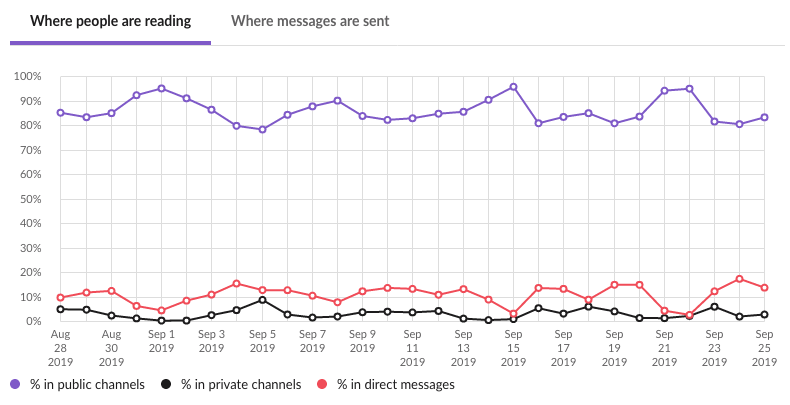Mastering the use of communication channels is part of keeping your team informed and efficient. It’s also crucial to creating an inclusive environment. This is true for all teams, but remote teams will feel the effects even more, since the majority of their communication happens online.
At thoughtbot, we avoid private messages whenever possible. Check out this graph from our Slack workspace which shows where the bulk of our conversations happen:

Private messages silo information, which means either people have to repeat themselves or others miss out on the conversation. When you don’t allow others the chance to participate, everyone misses out on an opportunity to learn from each other. Our Working Together guide has one point that sums up this issue well:
Everyone can participate: Assuming someone doesn’t want to participate can be exclusionary. Give people the opportunity to decline an invitation.
Giving everyone an equal chance to participate is the essence of inclusion. This way, it becomes the individual’s responsibility to decide which conversations they should be a part of.
What’s all that racket?
Keeping all conversations public means there’s going to be noise. Private messages aren’t the solution. Here are a few ways to manage a more active public chat:
Don’t have every conversation in #general. Create more topic-related
channels.
It takes a small conscious effort to determine which channel is most appropriate for a given conversation, and sometimes topics will overlap, but don’t get too hung up on it. As long as it’s working for the team, it’s a good move.
Don’t feel obligated to read the entire chat history. If you need someone’s
input, use their @handle.
This will be hard for the #inboxzero crowd to swallow, but with some adjustments, it’s not so anxiety-inducing. The biggest resistance to this advice is the fear of missing out caused by chat notifications. To mitigate this, try to move important discussions to an asynchronous platform. We make announcements using Constable, and important conversations happen in GitHub Issues and Pull Requests, which gives everyone the time to have input.
Only send private messages when necessary
Of course, some private messages are necessary. When I have trouble deciding if a message should be private, I ask myself this question: if the other person were in my physical office, would this conversation require a private room?
When you send direct messages to someone, they are private between you and the recipient. It’s akin to a private discussion two people might have in a small room. Slack
So, with all of that in mind, start talking to everyone!
